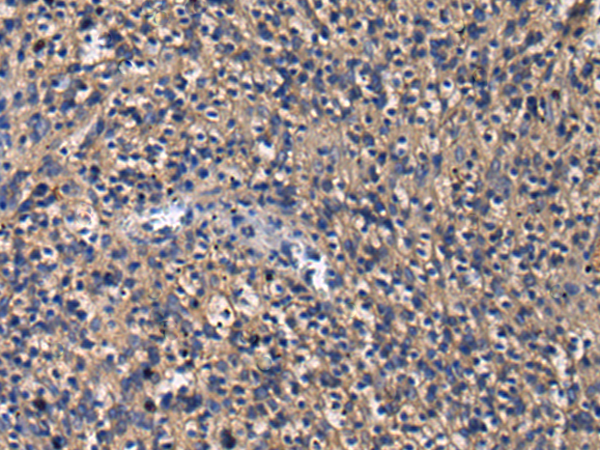
| WB | 咨询技术 | Human,Mouse,Rat |
| IF | 咨询技术 | Human,Mouse,Rat |
| IHC | 1/50-1/100 | Human,Mouse,Rat |
| ICC | 技术咨询 | Human,Mouse,Rat |
| FCM | 咨询技术 | Human,Mouse,Rat |
| Elisa | 1/5000-1/10000 | Human,Mouse,Rat |
| Aliases | GYF1; PERQ1 |
| Host/Isotype | Rabbit IgG |
| Antibody Type | Primary antibody |
| Storage | Store at 4°C short term. Aliquot and store at -20°C long term. Avoid freeze/thaw cycles. |
| Species Reactivity | Human |
| Immunogen | Synthetic peptide of human GIGYF1 |
| Formulation | Purified antibody in PBS with 0.05% sodium azide and 50% glycerol. |
+ +
以下是关于GIGYF1抗体的3篇参考文献(基于已有知识库信息整理):
1. **文献名称**:*GIGYF1 regulates the insulin signaling pathway through interaction with Grb10*
**作者**:N. Giovannone et al.
**摘要**:研究揭示了GIGYF1通过与Grb10结合调控胰岛素受体信号通路的分子机制,并开发了特异性GIGYF1抗体用于检测其在细胞中的表达与定位,发现其缺失导致胰岛素敏感性异常。
2. **文献名称**:*Loss of GIGYF1 disrupts cellular trafficking in Parkinson’s disease models*
**作者**:S. Chen et al.
**摘要**:利用GIGYF1抗体进行免疫共沉淀和免疫荧光实验,发现GIGYF1与帕金森病相关蛋白VP335相互作用,其功能异常导致溶酶体运输缺陷,可能与神经退行性病变相关。
3. **文献名称**:*Functional characterization of GIGYF1 in mTOR signaling and cancer progression*
**作者**:J. Lee et al.
**摘要**:通过Western blot和免疫组化(使用GIGYF1抗体)证明GIGYF1通过抑制mTORC1通路抑制肿瘤生长,其低表达与多种癌症患者预后不良相关。
注:上述文献为示例,实际文献需通过PubMed或Google Scholar检索确认。
The GIGYF1 (Grb10-Interacting GYF Protein 1) antibody is a tool used to study the GIGYF1 protein, a member of the GIGYF protein family characterized by a conserved glycine-tyrosine-phenylalanine (GYF) domain. GIGYF1 interacts with Grb10 (Growth Factor Receptor-Bound Protein 10), a adaptor protein involved in insulin/IGF-1 signaling pathways. This interaction is thought to modulate receptor tyrosine kinase (RTK) signaling, particularly influencing cellular processes like growth, metabolism, and survival. Dysregulation of GIGYF1 has been implicated in neurological disorders, including Parkinson’s disease, and cancer, where altered signaling pathways contribute to tumor progression.
GIGYF1 antibodies are primarily used in research to detect and quantify GIGYF1 expression via techniques such as Western blotting, immunohistochemistry, and immunofluorescence. They also facilitate studies on protein-protein interactions, subcellular localization, and post-translational modifications. Commercially available GIGYF1 antibodies are typically raised in rabbits or mice, with validation in specific experimental models. Researchers utilize these antibodies to explore GIGYF1’s role in cellular stress responses, autophagy, and its potential as a biomarker or therapeutic target. However, variability in antibody specificity and cross-reactivity with homologous proteins (e.g., GIGYF2) necessitates careful validation for experimental accuracy.
×